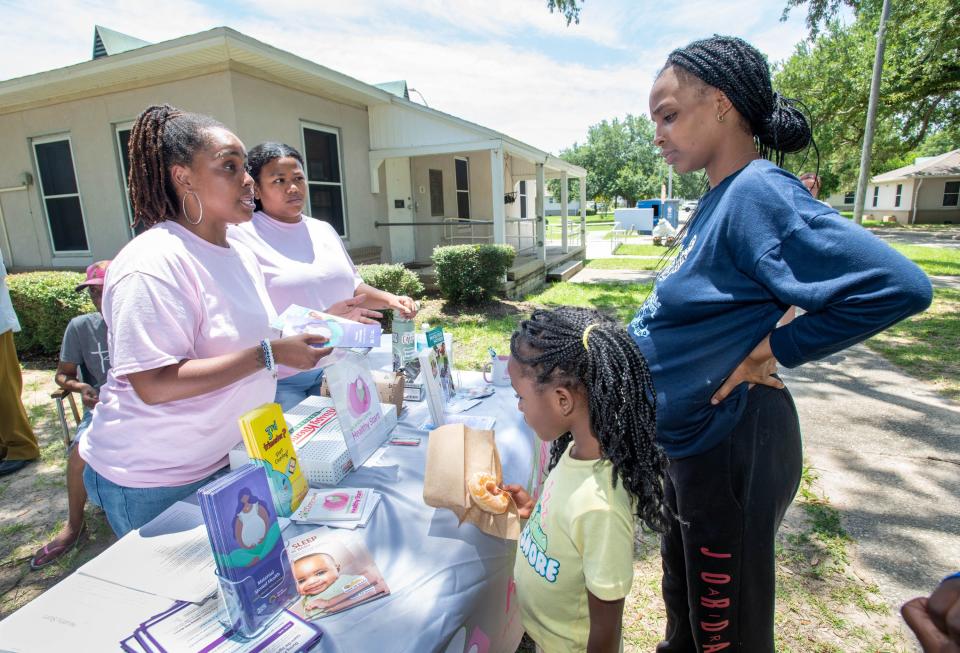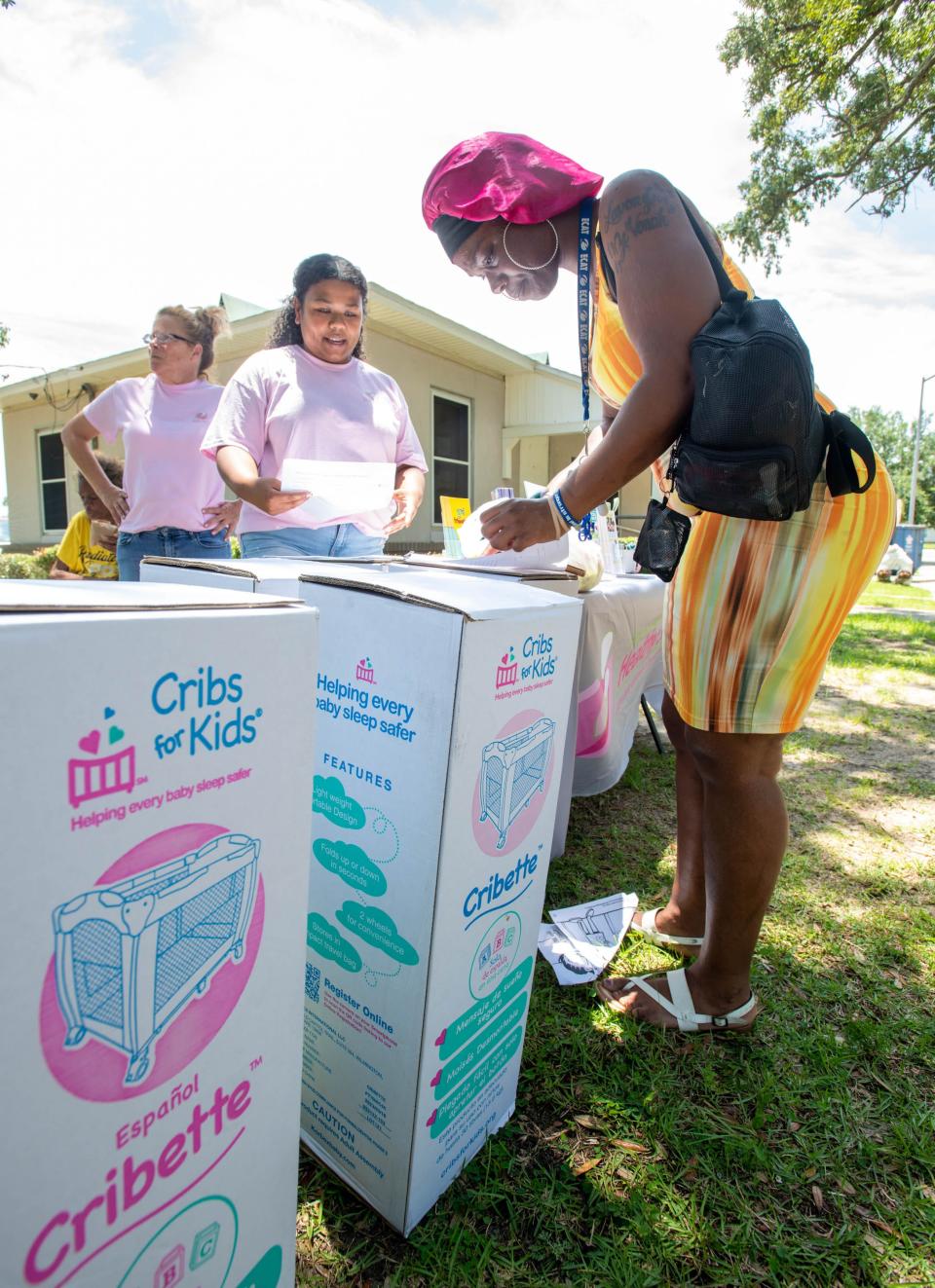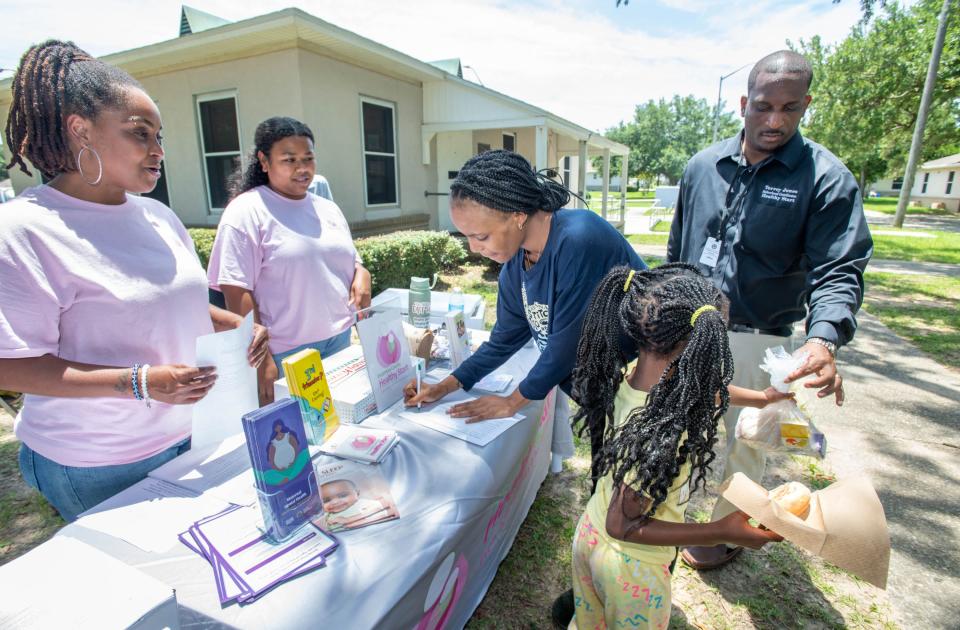Black infants in Escambia are dying at alarming rates ... and the rates are getting worse
Everything that Lena Burgess feared would go wrong did when she delivered her first child in May.
She was diagnosed with preeclampsia during labor, a pregnancy-related high blood pressure disorder, her son’s heartbeat was weakening, and she ultimately needed an emergency cesarean section.
“I was scared that I was not going to make it," Burgess said. "That was already a big fear going into the hospital, was that I'm not going to make it, even without knowing that I had preeclampsia or anything like that. That fear was real because of everything that you hear.”
Burgess is speaking about the harsh disparities regarding mortality rates for Black babies.
The Centers for Disease Control and Prevention define infant mortality as the death of an infant before his or her first birthday.
According to data from the Escambia County Healthy Start Coalition, from 2019 to 2021 white infant mortality deaths in Escambia County per 1,000 live births decreased from 7.6 to 4.2 annually. However, during that same time period the rate for Black infant mortality has increased from 8.7 to 13.8.

Ascension combating maternal health Pensacola-area infants have alarming mortality rates. A new program hopes to fix that.
How are babies dying? 'Such a tragedy': Sleep-related infant deaths spike in Escambia County
This disparity has been attributed to numerous factors affecting Black mothers, such as a lack of knowledge about prenatal care, poor diets, lack of community support and medical complications like high blood pressure disorder or preeclampsia that are often exacerbated by the aforementioned factors.
There are organizations working to provide care to expectant mothers and to help decrease infant and fetal deaths for all women in Escambia County. The biggest obstacle for them is reaching and building relationships with mothers so that they feel comfortable reaching out for help when they need it.
Giving Escambia County children and mothers a healthy start
Escambia County Healthy Start Coalition is one of 32 nonprofit organizations across Florida dedicated to improving the health of pregnant women and babies. They conduct the Fetal and Infant Mortality Review, a process of evaluating individual cases to understand systemic issues that contribute to infant deaths.
They offer a variety of programs and events to address issues mothers have during and after pregnancy, such as a home visiting program pairing mothers with care coordinators to provide one-on-one support. The mothers can get answers to personal health questions, guidance on what to ask nurses and health care providers or just help solving daily tasks like meal planning or getting transportation to appointments.
They also have yearly events called Baby Showers, which this year had over 400 attendees and served 175 moms with supplies like diapers and wipes, as well as information on postpartum mental health issues, child vaccinations and contraceptives. There is also the new Fatherhood Initiative offering education, training and support to help men become the best fathers and partners they can be.
Healthy Start Coalition conducted an outreach event Monday at Attucks Court where they conducted safe sleep education, distributed Pack and Play portable playards and connected families to resources such as Legal Services of North Florida.
Under the hot sun, small children ran around the neighborhood, adults gossiped on their front porches and moms walked up to get as much help as they could for their current or future children.

Ariel Cook recently moved into the housing complex with four children and one more on the way. She moved in two months ago after her father died and she lost her home and support, forcing her to move to Attucks Court.
She was doing her daughter's hair when one of the neighbors told her about the event just a few feet away from where she stays. Cook says some women's pride prevent them from getting the help they need but she always remember these moments are not about them but their children.
"I just really think a lot of women don't have a lot of support and knowledge," Cook said. "So having women that could give you a push to get up and go grab something, not just because it's free, but it's benefiting the child, not you. That's what I'm really worried about, the kids."
Claire Kirchharr, associate director of Escambia County Healthy Start Coalition, works with a lot of low income, single mothers trying to be the best moms they can, but many are so focused on their children they ignore themselves and suffer mental and physical health problems.
She wants moms to understand they can slow down and it's okay to take care of themselves.
“It's our name, we want to give every baby that healthy start. We want them to see their first birthday and so that's what our home visiting programs and our outreach and our fathers program are all about, is kind of all those social determinants that we know are going to affect those health outcomes ... kind of working upstream,” Kirchharr said. “Let's stop her from ever developing that high blood pressure because she's stressed about how she's going to get to her appointments or her childcare, those needs are taken care of, then her likelihood of having a safe birth goes dramatically up.”
Black mothers and bias
A 2022 study conducted for the National Bureau of Economic Research found America's poorest white mothers and infants have better health outcomes that wealthy Black families.
According to the CDC, Black women are three times more likely to die from a pregnancy-related cause than white women.
"Multiple factors contribute to these disparities, such as variation in quality healthcare, underlying chronic conditions, structural racism, and implicit bias," the CDC wrote.
Dr. Cynthia Smith-Peters, a nurse and a professor at University of West Florida, encourages a better relationship between providers and patients.
She is a volunteer for her Zeta Phi Beta sorority’s prenatal education program, Stork’s Nest. The program seeks to increase the number of healthy births for low-income women by providing courses in emotional health, nutrition and group discussions.

Smith-Peters stresses how one of the most important things for any women during their pregnancy or after childbirth is their education of the medical terminology and knowing what is healthy for themselves or the baby.
“I think as providers being open to learning about the individual needs of that patient, not stereotyping them, but learning about what this patient needs. I think that's the biggest thing,” Smith-Peters said. “And knowing that the patients do have a choice on how they're doing their health care, but giving them that education to make good informed decisions.”
When there are certain conditions like mild hypertension that should be treated, there are sometimes bias by providers who may not treat patients immediately or at all.
Dr. P. Michelle Grier-Hall, a pediatrician at Community Health Northwest Florida, says patients and mothers must be advocates for themselves.
"We don't feel empowered to ask the doctor for a medication to help with our blood pressure," Grier-Hall said. "We wait for the doctor and we take a more passive role and wait for the doctor to recommended, versus taking that more active role and requesting something to help control high blood pressure."
The big picture: In rural America, maternal health care is vanishing. These moms are most at risk.
An eye-opener: Serena Williams describes near-death experience she had after giving birth to daughter Olympia
Unchecked medical complications such as high blood pressure can cause placental insufficiency, where babies are not getting the right amount of blood flow through the placenta. That can cause a baby to have a low birth weight and put them at risk for other complications.
Other complications like diabetes can cause babies to be born larger than usual, which puts them at risk of having low blood sugars when they're first born, complicating the pregnancy and delivery. Those babies sometimes have to be monitored to make sure their blood sugar is stabilized. It also means babies are too large to be born vaginally, and sometimes they have to be born via C-section delivery, bringing risk of infection, blood loss, surgical injury to both the infant and mother, and risks of complications during future pregnancies.
Angela West-Robinson wants providers to pay attention to mothers, especially Black mothers', concerns because the last thing they want is to have a mother feeling like she does not have control over her own body during labor.
West-Robinson is a doula or a trained professional who provides continuous physical, emotional and informational support to a mother before, during and shortly after childbirth. Her job is to make sure to educate, support, give evidence based research, and most importantly allow moms to ask questions so they can feel empowered during and after pregnancy.
“It's about the wellness and health of you and that baby,” West-Robinson said. “So, are we willing to express ourselves and tell the whole truth in order for you to get what you need?”
She established Asabi Birth Services in 2012 and last year created a support group for Black women called Melanin Motherhood Support Group, a free monthly meeting that allows Black women and women of color to exchange support, love, resources, education and lean on one another.
Finding ways to reach mothers at their most vulnerable moment, during pregnancy and labor, is vital to making sure they can receive the care, support and resources without feeling they will be ignored.
Burgess, even through her setbacks, still was able to deliver a healthy baby boy. Going to support groups and birthing classes where she felt heard and not alone in her issues made a huge difference in handling her son's birth.
She wants others to know pregnancy takes a toll on a woman’s body and being able to know there is not only love, support and resources available but the ability to control their bodies and be heard makes a difference for mothers.
“It's a lot to grow a human being, so giving women grace in that area and understanding that our hormones are all over the place from the beginning of pregnancy into postpartum, labor, delivery, all of it,” Burgess said. “Our hormones are everywhere, our mind is going in 1,000 different directions and we're just trying to make it, we're trying to grow life and sustain ourselves.”
This article originally appeared on Pensacola News Journal: Escambia County Black infant deaths rise; Healthy Start educates moms

